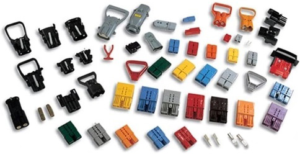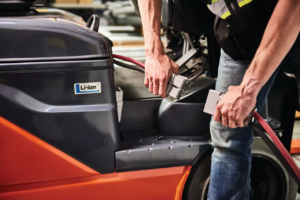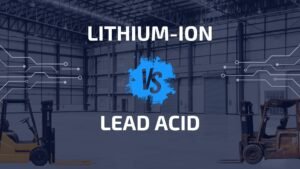In the competitive world of forklift rental, maximizing fleet availability and minimizing downtime are the keys to profitability. As customer demands grow and operations run longer hours, rental companies face increasing pressure to deliver reliable, high-performance equipment. One of the most impactful upgrades a rental company can make is transitioning its fleet from traditional lead-acid battery-powered forklifts to modern lithium-ion (Li-ion) battery technology. This shift isn’t just about keeping up with trends—it’s a strategic move to extend operating hours, reduce maintenance costs, and ultimately increase your bottom line.
Why the Shift Matters
Traditional lead-acid batteries have long been the standard in material handling. However, they come with significant operational drawbacks: long charging times (8+ hours), mandatory cooling periods, regular water topping, and acid spills that require special handling. These limitations lead to reduced equipment availability and higher labor and maintenance costs.
Lithium-ion technology, on the other hand, offers a transformative solution. With faster charging, opportunity charging capabilities, longer lifespan, and virtually zero maintenance, Li-ion forklifts stay in service longer and perform more reliably—directly translating to higher utilization rates and customer satisfaction.
Lead-Acid vs. Lithium-Ion Forklifts: A Comparative Overview
| Feature | Lead-Acid Battery Forklifts | Lithium-Ion Battery Forklifts |
|---|---|---|
| Charging Time | 8+ hours (plus 8-hour cool-down) | 1–2 hours (opportunity charging possible) |
| Maintenance | Weekly watering, cleaning, equalization | Virtually maintenance-free |
| Lifespan | 3–5 years (1,000–1,500 cycles) | 8–10+ years (3,000–5,000+ cycles) |
| Energy Efficiency | ~70% efficiency | ~95% efficiency |
| Downtime | High (due to long charge/cool cycles) | Minimal (can charge during breaks) |
| Operating Hours per Day | Typically 1–1.5 shifts | 2–3 shifts (with opportunity charging) |
| Total Cost of Ownership (TCO) | Higher (replacement, maintenance, energy) | Lower over time |
| Environmental Impact | Acid spills, lead disposal concerns | Cleaner, no emissions or leaks |
| Cold Weather Performance | Reduced performance | Stable performance |
| Battery Replacement Cost | Every 3–5 years | Every 8–10+ years |
Turning Technology into Profit
For a rental company, the benefits of lithium-ion are not just technical—they are financial:
- Increased Fleet Utilization: With opportunity charging, a single Li-ion forklift can support multiple shifts without battery swaps or long downtimes. This means one forklift can serve more customers or handle longer rental periods, boosting revenue per unit.
- Lower Operating Costs: Eliminating battery room maintenance, watering systems, and frequent replacements reduces labor and overhead. Energy savings of up to 30% further cut operational expenses.
- Enhanced Customer Satisfaction: Renters value reliability and uptime. Lithium-powered forklifts deliver consistent power throughout the shift and require less operator intervention, leading to higher customer retention and repeat business.
- Competitive Differentiation: Offering a modern, eco-friendly, high-performance fleet positions your company as an industry leader—appealing to forward-thinking logistics and manufacturing clients.
- Long-Term Asset Value: Li-ion forklifts retain value better due to their longer lifespan and lower wear, improving residual values and reducing depreciation losses.
The Upgrade Path
Transitioning doesn’t require replacing your entire fleet overnight. Start by converting high-utilization units or models frequently rented for multi-shift operations. Partner with OEMs or retrofit specialists who offer reliable lithium conversion kits, ensuring compatibility and safety compliance.
Conclusion
The future of material handling is electric—and lithium-ion is leading the charge. For forklift rental companies, upgrading to lithium-ion isn’t just a technological upgrade; it’s a strategic investment in profitability, sustainability, and customer satisfaction. By extending working hours, reducing costs, and enhancing fleet performance, lithium-ion technology empowers rental businesses to do more with less—driving higher returns and securing a competitive edge in a dynamic market.
Make the switch today, and power your profits tomorrow.



